Add description, images, menus and links to your mega menu
A column with no settings can be used as a spacer
Link to your collections, sales and even external links
Add up to five columns
Add description, images, menus and links to your mega menu
A column with no settings can be used as a spacer
Link to your collections, sales and even external links
Add up to five columns

Is There a Proper Way to Fold The American Flag?
12 min read
Folding the American Flag serves more than one Purpose
In a practical sense, a proper flag fold goes a long way in terms of flag care, maintenance, and storage.
You may not have occasion to fold a flag very often. But, it is Army and Navy custom to lower the flag daily, at the last note of retreat. The flag is then folded in a triangle shape.
It is said the shape is similar to that of hats worn by the colonial soldiers. Is the shape a coincidence, or intentional? We'll see.
As a symbolic gesture, flag folding plays an important role in showing respect for the flag and what it represents. It is a moving and meaningful part of many ceremonies, including funeral services and burial rites.
Knowing the basics and a little bit of history will serve you in many ways.
What is the proper way to fold the American flag?
For starters, there is no "official" way to fold the American flag.
The U.S. Flag Code is the first place to look for flag display and etiquette. It is full of rules governing when, where and how to display the US flag, but there are no guidelines on folding.
One reason is because flags vary in size. There is a standard ratio for government flags, but in practical use not all flags maintain the same ratios. Common flag sizes are 12x18", 2x3 Ft, 2.5x4, 3x5, 4x6, 5x8 and bigger.
Interment flags used for burial services are 5'x9.5'.
Not every flag will fold into the same shape with the same number of folds.
Since the flag code leaves us searching or answers, we turn to the branches of the Military, the VA (Department of Veterans Affairs), American Legion, VFW, and the Boy Scouts of America.
Even the Army, Air Force, Navy, Marines, and Coast Guard all have their own unique variations for handling the flag. (more on that later)
Our conclusion is that there is no "proper" or "correct" way to fold the American flag. But there is a model and best practice to follow.
Showing respect for the flag and what it represents is what really matters. The actual details leave room for interpretation.

Step by Step: How To Fold the American Flag
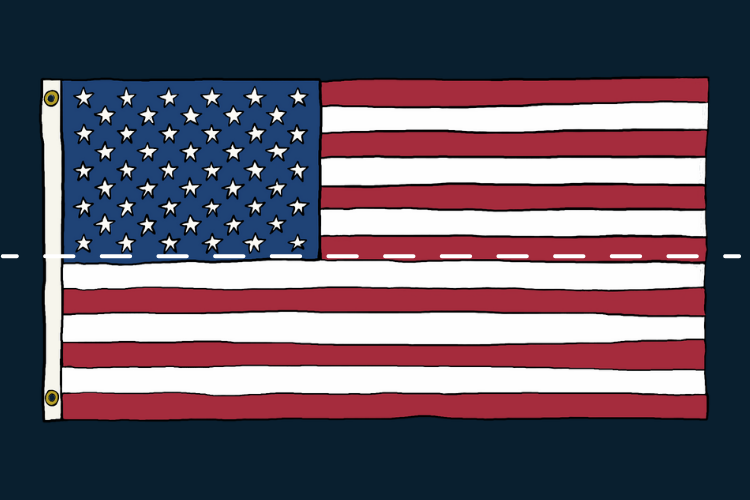
Hold the flag stretched out and parallel to the ground
(it helps to maintain tension between the two ends)
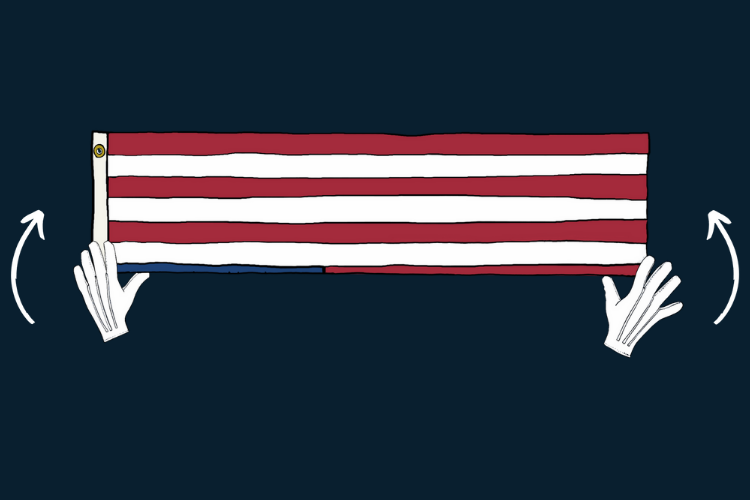
1. Fold in half lengthwise
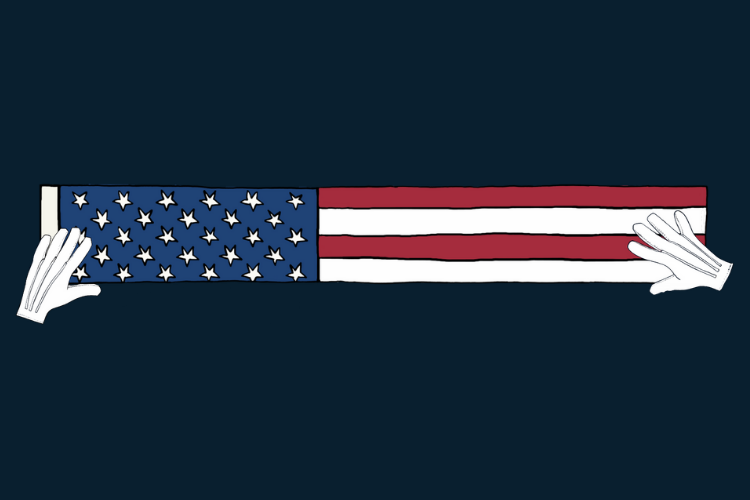
2. Fold in half again
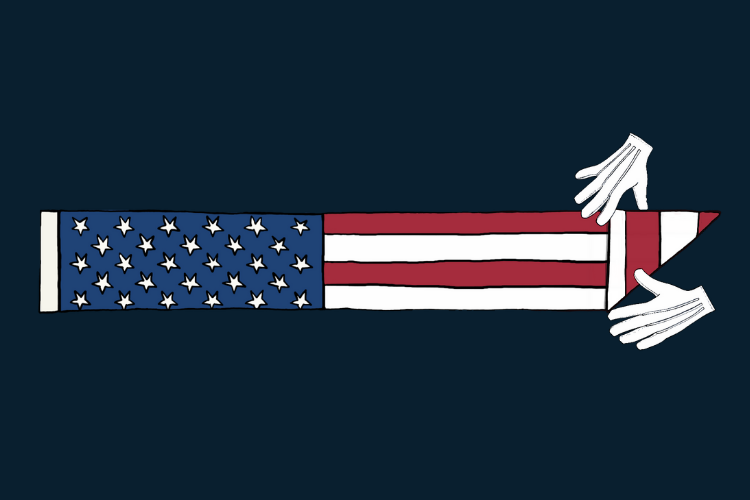
3. From the fly end, fold a triangle from the folded edge to the open edge
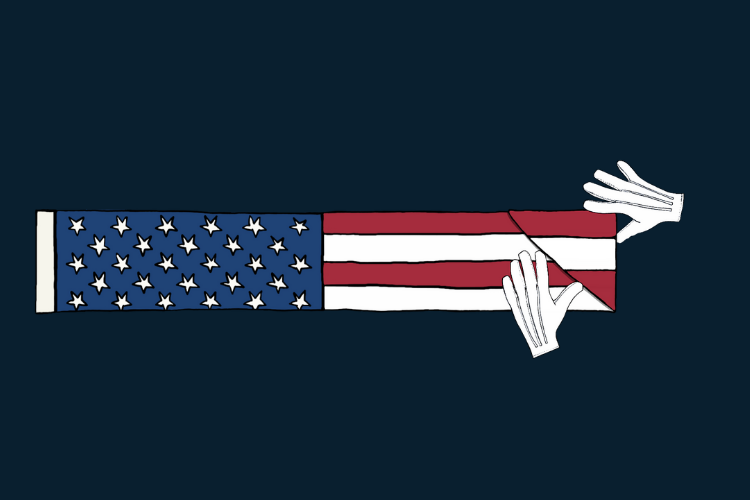
4. Repeat triangle folds toward the canton
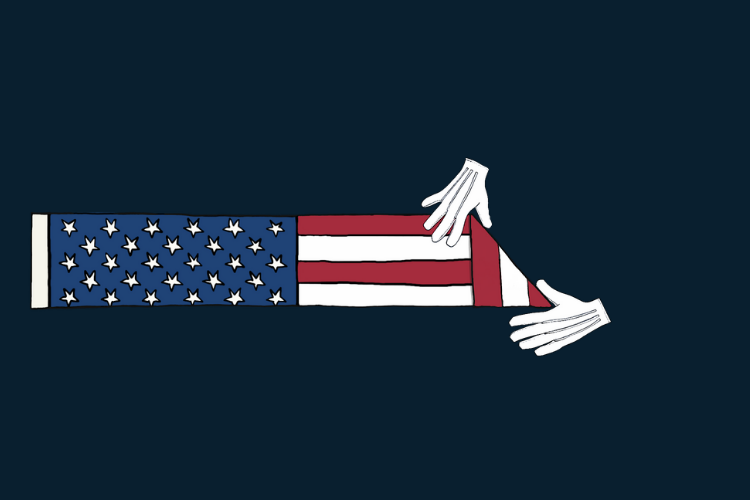
5. Continue triangle folds
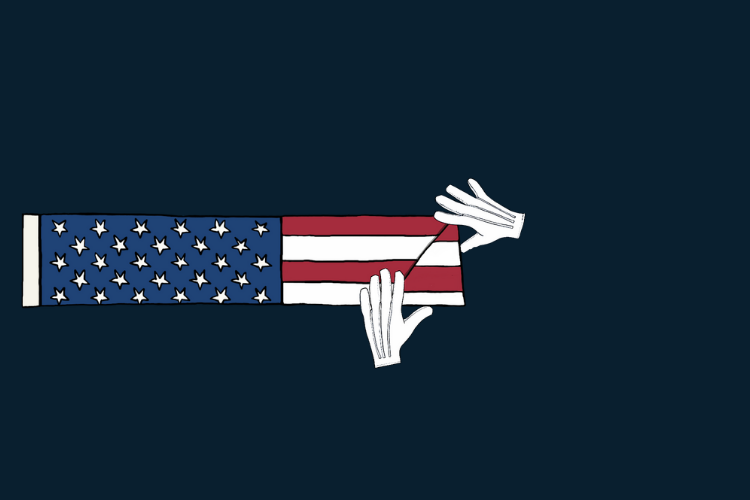
6. Repeat

7. There are 13 folds in total so keep going
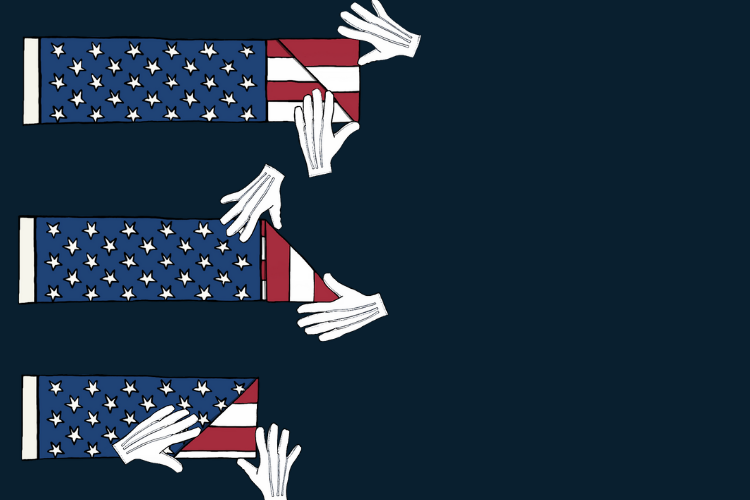
8. Getting close to the end
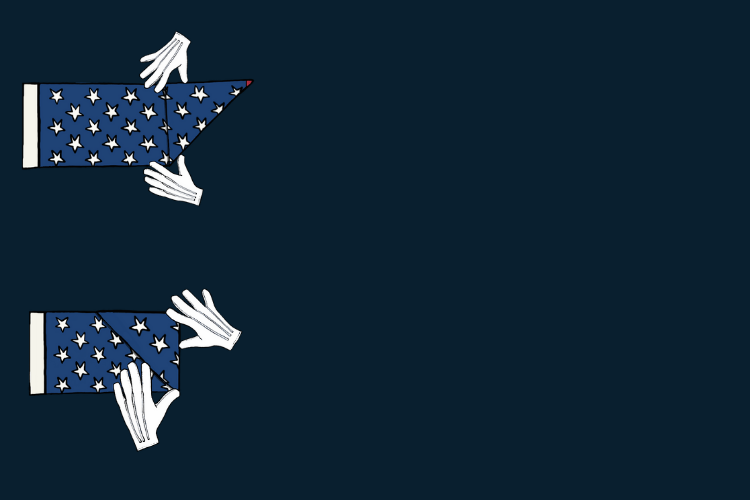
9. Whatever excess remains will fold into the triangle
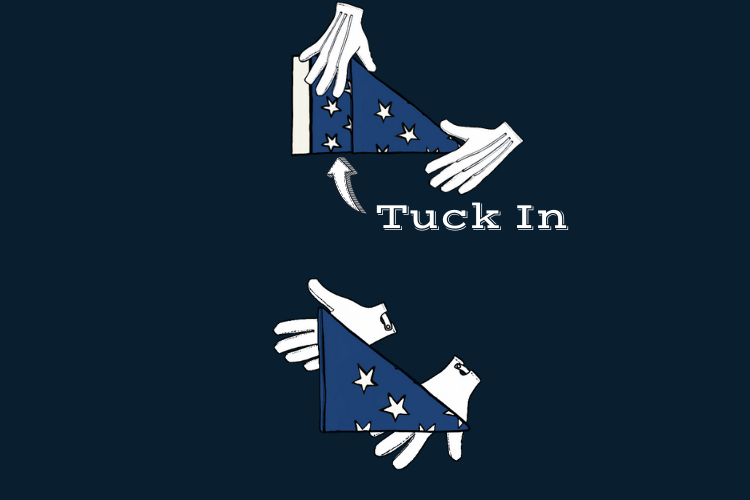
This is the most common and basic way to fold the American flag.
As we mentioned before each branch of the military adds their own subtle style to the pomp and circumstance of flag folding.
Here is a great example of a Marine Flag Folding. You might be surprised by the first fold and the end result.
Marine Corps Body Bearers - Respect
Do the folds of the American Flag Have Meaning?
Yes. The ceremony of folding the American flag carries great meaning and symbolic reference. If you ever had a doubt, watch the Marine Corps Body Bearers above.
But it's a little bit of the chicken or the egg when it comes to what came first.
Were these symbols and meanings planned? Probably not. (There is no evidence that they were.) We believe the 13 folds exist because they work. As times goes by, traditions emerge and people ascribe meaning.
We'll present the most common interpretations and you can apply what works for you.
Respect for the flag and what it represents is what is most important. The details leave room for freedom.
During flag folding ceremonies, often a "script" is read. These scripts embody the symbolism of each fold and its meaning. Here are some popular examples.
13 Folds For The American Flag
Using the method above, there are 13 folds. (As we mentioned before, not every flag is the same size, so it can vary, but 13 is most traditional.)
From the US Department of Veterans Affairs.
“Honoring the burial wishes of veterans is one of the highest commitments for the men and women of VA,” said William F. Tuerk, VA’s Under Secretary for Memorial Affairs. “A family may request the recitation of words to accompany the meaningful presentation of the American flag as we honor the dedication and sacrifice of their loved ones.”
Traditional gravesite military funeral honors include the silent folding and presentation of an American flag, a rifle salute, and the playing of “Taps.”
Volunteer honor guards are authorized to read the so-called “13-fold” flag recitation or any comparable script.
"13-Fold Script"
The flag folding ceremony represents the same religious principles on which our country was originally founded. The portion of the flag denoting honor is the canton of blue containing the stars representing the states our veterans served in uniform. The canton field of blue dresses from left to right and is inverted when draped as a pall on a casket of a veteran who has served our country in uniform.
In the Armed Forces of the United States, at the ceremony of retreat the flag is lowered, folded in a triangle fold and kept under watch throughout the night as a tribute to our nation's honored dead. The next morning it is brought out and, at the ceremony of reveille, run aloft as a symbol of our belief in the resurrection of the body.
(Wait for the Honor Guard or Flag Detail to unravel and fold the flag into a quarter fold--resume reading when Honor Guard is standing ready.)
- The first fold of our flag is a symbol of life.
- The second fold is a symbol of our belief in the eternal life.
- The third fold is made in honor and remembrance of the veteran departing our ranks who gave a portion of life for the defense of our country to attain a peace throughout the world.
- The fourth fold represents our weaker nature, for as American citizens trusting in God, it is to Him we turn in times of peace as well as in times of war for His divine guidance.
- The fifth fold is a tribute to our country, for in the words of Stephen Decatur, "Our country, in dealing with other countries, may she always be right; but it is still our country, right or wrong."
- The sixth fold is for where our hearts lie. It is with our heart that we pledge allegiance to the flag of the United States of America, and to the republic for which it stands, one nation under God, indivisible, with liberty and justice for all.
- The seventh fold is a tribute to our Armed Forces, for it is through the Armed Forces that we protect our country and our flag against all her enemies, whether they be found within or without the boundaries of our republic.
- The eighth fold is a tribute to the one who entered in to the valley of the shadow of death, that we might see the light of day, and to honor mother, for whom it flies on Mother's Day.
- The ninth fold is a tribute to womanhood; for it has been through their faith, love, loyalty and devotion that the character of the men and women who have made this country great have been molded.
- The tenth fold is a tribute to father, for he, too, has given his sons and daughters for the defense of our country since they were first born.
- The eleventh fold, in the eyes of a Hebrew citizen, represents the lower portion of the seal of King David and King Solomon, and glorifies, in their eyes, the God of Abraham, Isaac, and Jacob.
- The twelfth fold, in the eyes of a Christian citizen, represents an emblem of eternity and glorifies, in their eyes, God the Father, the Son, and Holy Ghost.
When the flag is completely folded, the stars are uppermost, reminding us of our national motto, "In God we Trust."
(Wait for the Honor Guard or Flag Detail to inspect the flag--after the inspection, resume reading.)
After the flag is completely folded and tucked in, it takes on the appearance of a cocked hat, ever reminding us of the soldiers who served under General George Washington and the sailors and marines who served under Captain John Paul Jones who were followed by their comrades and shipmates in the Armed Forces of the United States, preserving for us the rights, privileges, and freedoms we enjoy today.
13 Folds for 13 Colonies
You may have heard that the the 13 folds represent the 13 colonies that signed the Declaration of Independence and became the first 13 states.
(New Hampshire, Massachusetts Bay, Rhode Island, Connecticut, New York, New Jersey, Pennsylvania, Maryland, Delaware, Virginia, North Carolina, South Carolina, and Georgia.)
Maybe. Here is a that promotes the 13 State Symbolism.
Flag Folding Script
Fold 1: The 13 stripes represent the original 13 states: Delaware, Pennsylvania, New Jersey, Georgia, Connecticut, Massachusetts, Maryland, South Carolina, New Hampshire, Virginia, New York, North Carolina, and Rhode Island
Fold 2: The 50 stars represent our 50 United States of America
Fold 3: "I know not what course others may take; but as for me, give me liberty or give me death", Patrick Henry
Fold 4: "These are the times that try men's souls. The summer soldier and the sunshine patriot will, in this crisis, shrink from the service of their country; but he that stands it now, deserves the love and thanks of man and woman", Thomas Paine
Fold 5: "We hold these truths to be self-evident that all men are created equal. They are endowed by their creator with certain unalienable rights. Among these are life, liberty, and the pursuit of happiness", Declaration of Independence
Fold 6: "We the people of the United States, in order to form a more perfect union, establish justice, insure domestic tranquility, provide for the common defense, promote the general welfare, and secure the blessings of liberty to ourselves and our posterity, do ordain and establish this Constitution of the United States of America", United States Constitution
Fold 7: "Congress shall make no law respecting an establishment of religion, or prohibiting the free exercise thereof; or abridging the freedom of speech, or of the press, or the right of the people peaceably to assemble, and to petition the Government for a redress of grievances", First Amendment
Fold 8: "The basis of our political system is the right of the people to make and to alter their constitutions of government", George Washington
Fold 9: "My God! How little do my countrymen know what precious blessings they are in possession of, and which no other people on earth enjoy!" Thomas Jefferson
Fold 10: "Fourscore and seven years ago our fathers brought forth on this continent a new nation, conceived in liberty, and dedicated to the proposition that all men are created equal", Abraham Lincoln
Fold 11: "Give me your tired, your poor, Your huddled masses yearning to breathe free, The wretched refuse of your teeming shore. Send these, the homeless, tempest-tossed to me, I lift my lamp beside the golden door", Emma Lazarus, inscription on the Statue of Liberty
Fold 12: "Ask not what your country can do for you, but what you can do for your country", John Fitzgerald Kennedy
Fold 13: "I have a dream that my four little children will one day live in a nation where they will not be judged by the color of their skin, but by the content of their character", Martin Luther King, Jr.
Air Force Flag Folding Script
Lt. Col. Samuel Hudspath, Air Force protocol chief, said "Though there are no official ceremonies in the Air Force that require a script to be read when a flag is folded, unofficial ceremonies such as retirements often do."
“We have had a tradition within the Air Force of individuals requesting that a flag be folded, with words, at their retirement ceremony.”
And here is what they read during flag folding:
For more than 200 years, the American flag has been the symbol of our nation's unity, as well as a source of pride and inspiration for millions of citizens.
Born on June 14, 1777, the Second Continental Congress determined that the flag of the United States be thirteen stripes, alternating between seven red and six white; and that the union be thirteen stars, white in a blue field representing a new constellation.1
Between 1777 and 1960, the shape and design of the flag evolved into the flag presented before you today. The 13 horizontal stripes represent the original 13 colonies, while the stars represent the 50 states of the Union. The colors of the flag are symbolic as well; red symbolizes hardiness and valor; white signifies purity and innocence; and blue represents vigilance, perseverance and justice.1
Traditionally, a symbol of liberty, the American flag has carried the message of freedom, and inspired Americans, both at home and abroad.
In 1814, Francis Scott Key was so moved at seeing the Stars and Stripes waving after the British shelling of Baltimore's Fort McHenry that he wrote the words to The Star Spangled Banner.3
In 1892 the flag inspired Francis Bellamy to write the "Pledge of Allegiance," our most famous flag salute and patriotic oath.3
In July 1969 the American flag was "flown" in space when Neil Armstrong planted it on the surface of the moon.3
Today, our flag flies on constellations of Air Force satellites that circle our globe, and on the fin flash of our aircraft in harms way in every corner of the world. Indeed, it flies in the heart of every Airman who serves our great Nation. The sun never sets on our US Air Force, nor on the flag we so proudly cherish.3
Since 1776 no generation of Americans has been spared the responsibility of defending freedom... Today's Airmen remain committed to preserving the freedom that others won for us, for generations to come.
By displaying the flag and giving it a distinctive fold we show respect to the flag, and express our gratitude to those individuals who fought, and continue to fight for freedom, at home and abroad. Since the dawn of the 20th century, Airmen have proudly flown the flag in every major conflict on lands and skies around the world. It is their responsibility ... our responsibility ... to continue to protect and preserve the rights, privileges and freedoms that we, as Americans, enjoy today.
The United States flag represents who we are. It stands for the freedom we all share and the pride and patriotism we feel for our country. We cherish its legacy, as a beacon of hope to one and all. Long may it wave.
Flag Folding Script Used By the Boy Scouts of America
#1 In honor of the thirteen original colonies and our forefathers who founded this great nation, we salute you.
#2 To the men who died in the War for Independence, we salute you.
#3 To those men who fell in the War of 1812, to preserve our freedom, we salute you.
#4 To the brave soldiers on both sides, The North and The South, in the Civil War, we salute you.
#5 To those who shed their blood in the name of hope and freedom in The Great War, we salute you.
#6 For our fathers and sons who died in the terrible battles of World War Two, Pearl Harbor, Anzio, Midway, The Bulge, Iwo Jima, Guadalcanal, Normandy, and Berlin, we salute you.
#7 To the men of the First Marine Division, who, in a rear guard action at the Chosin Reservoir in Korea saved their battalion and the lives of their brother Marines, we salute you.
#8 For the brave men and women of our armed forces who died on the fields of fire in Vietnam and whose names will live on forever on that hallowed wall, we salute you.
#9 For our commander in chief, who leads our nation in good times, and bad, we salute you.
#10 For the Boy Scouts of America and all the Scouts who have gone before us, we salute you.
#11 To God, our parents and our families who we love and respect, we salute you.
#12 To the men and women of our armed forces, the Arsenal of Democracy and the Hammer of Freedom, we salute you.
#13 And last, to freedom, because with out freedom there is no honor, without honor, we are not Americans, and on this we vow, that as long as this flag flies, we salute you.
FAQs
How many times is the American flag folded?
Typically there are 13 folds when folding the American flag. But, the American flag is available in many sizes and even a few different ratios, so 13 folds won't always end up in a triangle. In addition, each branch of the military has their own variations and ceremony when folding the flag.
Why is the American flag folded into a triangle?
Common folklore says the flag is folded into a triangle similar to the hats worn by colonial soldiers. It is more likely that the flag is folded into a triangle because it works well. Over time, the process has become ceremonial, showing respect for the flag itself and all that it represents.
Is there a proper way to fold the American flag?
There is no "official" rule to follow when folding the American flag. However, a standard has become common. Generally, there are 13 folds moving from the fly end toward the canton, and ending in a triangle. Practically, this works well for display, and storage. It also has become a traditional ceremony performed at important events.
Do the folds of the American flag have meaning?
The short answer is, yes, but not officially. There are many scripts that are commonly read during American flag folding ceremonies. The scripts describe the folds and what they represent. The scripts share common themes, but are open for interpretation and there is no universal answer.
Knowing how to properly fold your American Flag is a useful skill. It promotes flag care, maintenance, safe storage, and demonstrates great respect.
Thank you.
And thank you to all veterans who protect and serve the American flag. Check out the Veterans Guide for support and resources.
THE END
Shop the Fine Line Flag Collection!

Is There a Proper Way to Fold The American Flag?
April 04, 2020 12 min read
13 Folds of the American Flag
Read More

American Flag - Understanding the Parts of the US Flag
February 27, 2020 9 min read
Official flag dimensions and terminology of Old Glory explained.
Read More

How To Choose the Best Flag Material | Indoor and Outdoor
February 09, 2020 9 min read
How to choose the best flag material—spoiler—it depends. Let us help.
Read More



